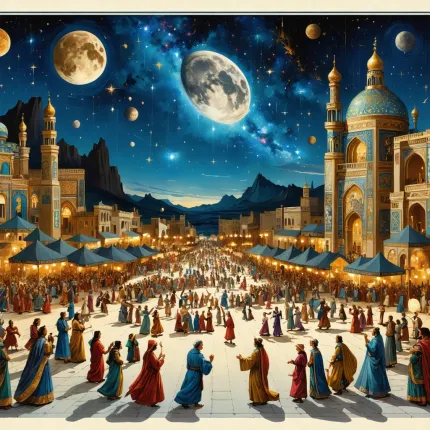Guru: Wisdom’s Global Guide: Guru figures inspire learning in spiritual and academic realms.

The Ever-Present Quest for Guidance
Have you ever found yourself at a crossroads, yearning for more than just information—a deeper understanding, a guiding light that transcends mere facts? Throughout history, the human journey has been marked by a persistent search for wisdom, a hunger to connect with insights that can shape our inner and outer worlds. Enter the guru: a figure who embodies this quest, serving as a beacon for those navigating the complex landscapes of both spiritual awakening and intellectual growth.
In a world saturated with data and opinions, the role of a guru—whether a revered spiritual leader or an influential educational figure—remains uniquely vital. These individuals don’t just dispense knowledge; they inspire transformation, encouraging learners to peel back layers of superficial understanding and engage with profound truths. But why, in an age of instant access to information, do we still turn to gurus? What is it about their presence that fosters genuine change?
Why Modern Seekers Still Crave the Wisdom of Gurus
Think about the last time you tried to learn something complex or tackle a challenging life question. Did you simply google it and move on? Or did you find yourself longing for a mentor, a trusted guide who could illuminate the path with experience and empathy? This longing reveals a deeper issue in contemporary education and spirituality: the gap between raw data and meaningful wisdom.
Spiritual leaders, often hailed as gurus, have long been the custodians of ancient wisdom and transformative practices. Their teachings don’t just inform—they change perspectives, heal wounds, and awaken consciousness. Yet, their influence extends beyond temples and meditation halls. Educational influencers—modern-day gurus in academic and professional fields—play a similar role. They shape thought, challenge norms, and motivate learners to push boundaries.
Without such guiding figures, the risk is twofold:
- Superficial Learning: The flood of information can overwhelm, leading to fragmented knowledge that lacks coherence and depth.
- Spiritual Disconnection: In the absence of mentorship, seekers may feel isolated, missing the communal and experiential elements crucial for true growth.
These challenges highlight why the guru’s role remains indispensable. They bridge the gap between knowledge and wisdom, acting as catalysts for both spiritual awakening and intellectual mastery.
Charting the Course: What This Article Will Explore
In the sections that follow, we’ll delve into the multifaceted role of gurus across cultures and disciplines. You’ll discover how spiritual leaders have shaped traditions and inspired inner transformation, and how educational influencers have revolutionized learning paradigms in the modern world.
We’ll explore compelling stories of individuals who have embodied the guru archetype, demonstrating the timeless power of dedicated mentorship. Furthermore, we’ll examine the distinctive qualities that make a guru’s guidance effective and relevant today, revealing lessons that anyone striving for growth—spiritual or academic—can apply.
If you’ve ever wondered how to find a true mentor in a sea of noise, or how to become a guiding light yourself, this article is your starting point. Together, we’ll unpack the essence of what it means to be a guru, tracing a path toward wisdom that resonates globally and personally.

Guru: Wisdom’s Global Guide
Who is a Guru and Why Are They Important?
A guru traditionally refers to a spiritual teacher or guide who imparts wisdom, knowledge, and guidance to disciples. Originating from ancient Indian traditions, the term "guru" has transcended its initial spiritual context to encompass figures in various domains, including education and personal development.
Gurus serve as pivotal figures by offering insight that bridges experiential knowledge and theoretical learning. Their role is crucial because they:
- Provide personalized mentorship and spiritual guidance.
- Influence the transfer of cultural and academic knowledge.
- Help seekers navigate complex philosophical or practical issues.
Understanding the role of a guru helps us appreciate how spiritual leaders and educational influencers shape both individual growth and broader cultural paradigms.
How Do Spiritual Leaders Function as Gurus?
Spiritual leaders who are regarded as gurus often embody deep philosophical insight combined with lived experience. They guide followers through teachings that promote inner peace, ethical living, and enlightenment. Examples of such gurus include figures like Paramahansa Yogananda and the Dalai Lama, who have inspired millions worldwide.
These spiritual leaders serve as beacons of wisdom because they:
- Offer frameworks for understanding existence beyond material life.
- Encourage mindfulness, meditation, and self-awareness practices.
- Act as role models demonstrating compassion, discipline, and resilience.
By facilitating spiritual awakening, gurus help individuals cultivate a purposeful life aligned with higher values.
What Role Do Educational Influencers Play as Modern Gurus?
In the academic and professional realms, educational influencers have emerged as contemporary gurus. These individuals leverage platforms like social media, podcasts, and online courses to disseminate knowledge and inspire learning worldwide.
Unlike traditional gurus, educational influencers often focus on:
- Democratizing access to education through digital tools.
- Fostering communities of learners and collaborative knowledge sharing.
- Promoting skills development relevant to the modern economy.
For instance, educators like Sal Khan of Khan Academy have revolutionized how millions access quality education, embodying the guru’s role in guiding learners toward mastery and empowerment.
Why Are Gurus Still Relevant in the Digital Age?
Despite advancements in technology and information availability, the guru’s role remains significant because:
- People seek trusted, authoritative voices amidst information overload.
- Personalized mentorship and context-specific advice cannot be fully replaced by algorithms.
- Spiritual and emotional guidance continues to meet deep human needs not addressed by data alone.
Moreover, the fusion of traditional guru wisdom with modern educational methods creates a holistic approach to learning that addresses both intellectual and existential dimensions.
How Can One Identify a Genuine Guru Among Many?
With the proliferation of self-proclaimed gurus, especially online, discerning authenticity is critical. Here are key indicators of a genuine guru, whether a spiritual leader or educational influencer:
- Proven expertise: Demonstrated mastery in their field supported by credentials or longstanding practice.
- Ethical integrity: Transparent, consistent behavior aligned with their teachings.
- Impact: Positive, measurable influence on followers or learners’ lives.
- Humility: Willingness to learn and evolve rather than claim infallibility.
Engaging with a guru who meets these criteria ensures a beneficial and enriching learning experience.
Conclusion: Embracing the Global Guide
The concept of the guru transcends culture and discipline, encompassing spiritual leaders who awaken inner wisdom and educational influencers who democratize knowledge. Together, they inspire holistic learning that nurtures both the soul and the mind.
In today’s interconnected world, embracing gurus as global guides enriches our understanding, empowers personal growth, and fosters communities grounded in wisdom and shared learning.




